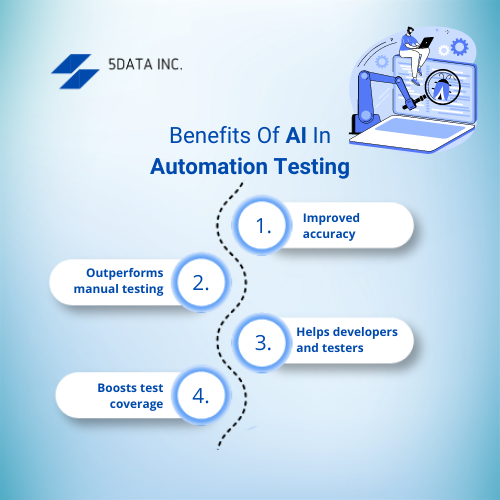Altering Dynamics Of Automation Testing Using AI
As technology develops, more companies are beginning to adopt agile and DevOps practices. However, the use of these approaches necessitates the use of strong ai testing tools that support continuous testing and release. It is where AI-powered test automation technologies come into play.
Businesses may complete tests faster and deliver highly reliable products on schedule by integrating AI into software testing. Moreover, AI-powered test automation solutions help DevOps practices and provide human-like decision-making abilities, resulting in the faster release of high-quality software.
Meanwhile, next-generation AI-based testing services from a next-generation testing service provider like 5Data Inc will enable production releases more quickly and accurately.
Advantages of Using AI In Automation Testing
AI-driven automation testing accelerates customer satisfaction in the application. In this process, an application is observed by testers under particular conditions to know the risks and threshold during the software implementation. Now let’s learn some significant advantages of AI in software testing.
1. Improved accuracy
Automated testing is beneficial because it consistently completes repetitive tasks correctly and records all relevant results. By automating redundant test cases, testers are freed from tedious manual testing. They can devote more time to developing new automated software tests, handling complicated features, developing coding skills, and hence provide better application development services.
2. Outperforms manual testing methods
It is nearly impossible for the most experienced software quality assurance (QA) testers to implement a controlled web application test with many users. Through software automation testing, one can simulate as many virtual systems of users that can associate with software and network, overcoming tedious and manual aspects.
3. Helps testers and developers
Before sending it to the QA team for the QA process, developers can use shared automated test cases to understand the problems. Tests automatically run when the source code is modified, checked in, and notified to the developer or the team if it fails. Such features boost developers’ confidence and provide better data life cycle management services. It simplifies test execution for software developers.

4. Boosts test coverage
With automated testing, it is possible to increase the breadth and depth of tests, which enhances the overall quality of software. The behavior of the software can be evaluated using automated testing by looking at the contents of memory and files, internal program states, and data tables. Test automation may run more than 1000 test cases in a single test run, ensuring coverage that manual tests cannot and also understands the parts of a document object model.5. Role of UI
Businesses regularly modify the app user interface to provide a consistent user experience. Even if the modifications are invisible, it might lead to the failure of test scripts during the execution of many operations on the page. User interface testing aims to simplify usage. AI and ML are taught to detect bugs and minor changes in application issues. These technologies are trained to take the right steps without the necessity of human interference to update scripts for modifications.6. Maintains test scripts and test suites
Maintaining the entire test suite and scripts as applications grow is challenging. That’s when tools play their role of extracting and maintaining appropriate test scripts for testing needs. AI assists in overcoming traditional test automation, manual tests, and the intervention of human testers.Different Methods of Software Automation Testing
Regression suite automation testing
Continuous and Regression testing consumes a lot of effort and testing time for test cases from the tester. Regression suite automation associated with ai generates automated test cases intelligently depending upon the modifications in the code each time. Regression tests’ main goal is to reduce the time it takes to run regression test cycles and the appropriate test cases.Automated self-healing
Automated self-healing automation test script breakages that may occur due to an object or other property changes are a part of the AI-based self-healing process. This test aims to ensure that less manual intervention is needed and accelerate the self-healing process.Defect prediction and analysis
Here comes the application of machine learning and natural language processing to boost the accurate detection of software defects. This test containing machine learning algorithms aims to guarantee early defect detection and assist firms in getting into the market faster.Top AI Test Automation Tools
UiPath Test Suite
It associates the leading technologies in RPA with classic testing capabilities to speed up the scale of testing processes via proactive testing, enterprise cooperation, and a consistent approach to creating and deploying automation. It helps stakeholders and automation practitioners who depend on automation, like business users, partners, transformational leaders, and customers.Tricentis Tosca
It is an enterprise solution utilized for automated software testing. This solution has brilliant capabilities like Vision AI, model test automation, risk-related automation testing, and many more. This tool’s Vision AI feature uses AI’s power to customize testing.Parasoft
It is an artificial intelligence-based tool that automates test cases at any level of the software development phase. It is a complete test suite that incorporates AI and ML into software testing to help businesses deploy static analysis. This tool detects defects early and assures compliance with various security, operational security, and coding needs.Functionize
This tool is a cloud-based testing solution for both functional testing and non-functional testing. It boosts test generation and management by using AI and ML methods. This application promotes hundreds of test runs and simplifies testing from desktops and mobile browsers in a minute.Conclusion
For any company to stay on top of the game, integrating the strength of AI and strong AI Services into software testing is necessary. Also, you can benefit from a shorter time to market, lower costs, increased accuracy, and—most importantly—a trustworthy product for your consumers with AI-driven testing. At 5Data Inc., we are proud of our outstanding track record of providing top-notch automation and software testing services. Why wait, then? Contact our specialists immediately, and let’s work together to make your ideas a reality!
